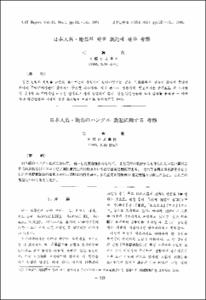'憲法的 刑事訴訟'의 觀點에서 본 刑事節次上의 權利 및 制度 保障
- Alternative Title
- The Accused's Rights from the Standpoint of Constitutional Criminal Procedure
- Abstract
- 헌법적 형사소송'의 구현이 현 시기 우리 형사소송법학의 과제라고 할 때, 형사소송법학의 여러 쟁점을 논의하는데 있어서 우리는 1987년 헌법개정이 무엇을 형사소송법학에 요구하고 있는가를 분명히 하는데서 출발해야 한다. 이 글은 형사피의자 ㆍ 피고인의 형사절차상의 인권과 관련된 형사소송법적 문제를 크게 세 가지로 나누어 살펴 본다. 첫째, 헌법이 '적정절차'의 이념을 형사절차의 지도이념으로 선언하였다는 것의 실천적 함의가 무엇인가를 확인한다. 둘째, 헌법 제27조 4항에 규정된 '무죄추정의 원칙'의 의미를 정리하면서 현재 우리 형사절차에서 이 원칙은 어떠한 상태에 있는가를 검토한다. 셋째 이상 두 가지 원칙의 구체적 실현태인 헌법 제12조가 상세히 규정하고 있는 형사피의자 ㆍ 피고인의 형사절차상의 인권의 의미와 현황을 점검한다. 넷째 헌법상 기본권으로 선언되지 않았으나 헌법에서 요청하고 있는 형사절차상의 제도보장을 위하여 무엇이 필요한가에 대하여 의견을 제시 한다.
The new 1987 Constitution brought a significant change in the theory and practice of the Korean criminal procedure. Explicitly stipulating the idea of due process in criminal procedure, the Bill of Rights in the Constitution has become a "living document." The 1988 and 1995 amendments to the Korean Criminal Procedure Code have also strengthened the procedural rights of criminal suspects and defendants to some degree. The newly established Korean Constitutional Court and the Korean Supreme Court have made important decisions for such rights. However, there still remain a number of problems which disturb the trim in the Constitution and overshadows the constitutional procedural rights. Police practices of avoiding the warrant requirements for arrest and search-and-seizure have continued. Guarantees of procedural rights for criminal suspects in police interrogation still remain incomplete and fragile. Investigators enjoy their dominant role in the criminal procedure, while citizens are treated merely as an object of the investigation. The judiciary is very reluctant to exclude the illegally obtained physical evidence in a trial.
The new 1987 Constitution brought a significant change in the theory and practice of the Korean criminal procedure. Explicitly stipulating the idea of due process in criminal procedure, the Bill of Rights in the Constitution has become a "living document." The 1988 and 1995 amendments to the Korean Criminal Procedure Code have also strengthened the procedural rights of criminal suspects and defendants to some degree. The newly established Korean Constitutional Court and the Korean Supreme Court have made important decisions for such rights. However, there still remain a number of problems which disturb the trim in the Constitution and overshadows the constitutional procedural rights. Police practices of avoiding the warrant requirements for arrest and search-and-seizure have continued. Guarantees of procedural rights for criminal suspects in police interrogation still remain incomplete and fragile. Investigators enjoy their dominant role in the criminal procedure, while citizens are treated merely as an object of the investigation. The judiciary is very reluctant to exclude the illegally obtained physical evidence in a trial.
- Issued Date
- 2000
- Type
- Research Laboratory
- Alternative Author(s)
- Cho, Kuk
- Publisher
- 사회과학논집
- Language
- kor
- Rights
- 울산대학교 저작물은 저작권에 의해 보호받습니다.
- Citation Volume
- 10
- Citation Number
- 1
- Citation Start Page
- 305
- Citation End Page
- 316
- Appears in Collections:
- Research Laboratory > Journal of social science
- 파일 목록
-
-
Download
 000002024642.pdf
기타 데이터 / 490.54 kB / Adobe PDF
000002024642.pdf
기타 데이터 / 490.54 kB / Adobe PDF
-
Items in Repository are protected by copyright, with all rights reserved, unless otherwise indicated.